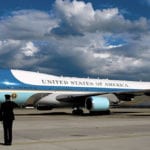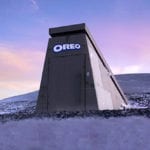 Mysteries
Mysteries  Mysteries
Mysteries  History
History 10 Surprising Stories About the Texas Rangers
 Humans
Humans 10 Philosophers Who Were Driven Mad by Their Own Theories
 Miscellaneous
Miscellaneous 10 Video-Game-Worthy Weapons and Armors from History
 Weird Stuff
Weird Stuff 10 Psychics Who Accurately Predicted Wartime Events
 The Arts
The Arts 10 Pieces of Art Inspired by a Broken Heart
 Health
Health 10 Science Fiction-Sounding New Medical Treatments
 History
History 10 Surprising Facts About the Father of Submarine Warfare
 Space
Space Ten Astonishing New Insights into Alien Worlds
 Weird Stuff
Weird Stuff 10 Bizarre Summer Solstice Rituals Still Practiced Today
 Mysteries
Mysteries Top 10 Haunting Facts About the Ghost Ship MV Alta
 History
History 10 Surprising Stories About the Texas Rangers
 Humans
Humans 10 Philosophers Who Were Driven Mad by Their Own Theories
Who's Behind Listverse?

Jamie Frater
Head Editor
Jamie founded Listverse due to an insatiable desire to share fascinating, obscure, and bizarre facts. He has been a guest speaker on numerous national radio and television stations and is a five time published author.
More About Us Miscellaneous
Miscellaneous 10 Video-Game-Worthy Weapons and Armors from History
 Weird Stuff
Weird Stuff 10 Psychics Who Accurately Predicted Wartime Events
 The Arts
The Arts 10 Pieces of Art Inspired by a Broken Heart
 Health
Health 10 Science Fiction-Sounding New Medical Treatments
 History
History 10 Surprising Facts About the Father of Submarine Warfare
 Space
Space Ten Astonishing New Insights into Alien Worlds
 Weird Stuff
Weird Stuff 10 Bizarre Summer Solstice Rituals Still Practiced Today
10 Highly Guarded Vaults
Most governments have their fair share of vaults and covert bunkers, but there are a whole slew of other, privately-owned, depositories that are as equally protected as any military base. While we’re sure those in the doomsday or “prepper” crowd have some pretty impressive bunkers of their own, here are some of the most highly guarded vaults we actually know about.
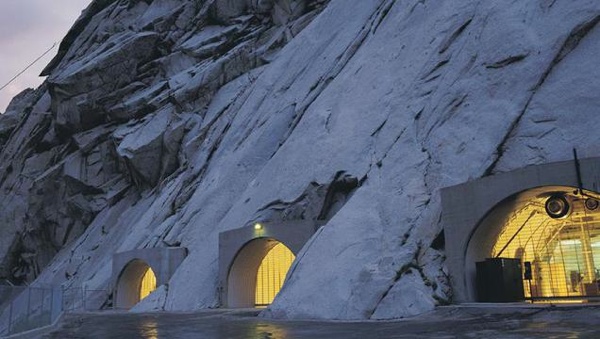
The Mormon Vault, a.k.a the Granite Mountain Records Vault, is owned by the Church of Jesus Christ of Latter Day Saints and is built 600-feet into the side of a giant rock in Little Cottonwood Canyon, Utah. Although surrounded by rock (technically quartz—not granite), don’t think you can go dynamiting your way in there as it was constructed to withstand a nuclear blast and has steel, bank-safe type doors designed to seal tighter under impact. There are some administrative offices inside the complex, but it is not open to the public or even church members.
So, what kind of top secret stuff is a religious group squirreling away in an underground lair? Supposedly, just some humdrum genealogy records and other church documents. Still, a cavern capable of surviving the apocalypse does seem a little overkill for storing paperwork, which has led some to assume there are more mysterious things being kept in the bunker. For instance, Mormon detractors believe the vault contains discrepant church historical documents that are being suppressed to avoid making the church look bad or possibly prove the whole religion was fabricated.
Mormon leaders dismiss the conspiracy theories and say the reserve holds nothing more than microfilm and microfiche that the church is restoring and converting to digital media. They even have a “behind the scenes video tour” of Granite Mountain Records on YouTube.
The Pionen Bunker is a co-location center that rents secure space and bandwidth to a variety of retail customers. Currently, one of their most notable renters is WikiLeaks, the famous stateless news agency and unapologetic whistleblowers.
While multiple governments, corporations, and anyone else with major secrets to hide might wish WikiLeaks was more vulnerable, its servers are exceptionally safeguarded in the Pionen Bunker, a former civil defense center concealed in the side of White Mountain in Stockholm. The Swedish Internet service provider Bahnhof converted the fortified space into a data center and defended the bunker with a 40-centimeter thick door that’s only accessible by one tunnel and capable of withstanding a hydrogen bomb.
When you look at pictures of Pionen it resembles something straight out of a spy movie, complete with futuristic-looking panels of computers, a floating glass conference room, and everything surrounded by rough mountain walls. Somehow it seems like the perfect location for the white-haired WikiLeaks founder, Julian Assange.
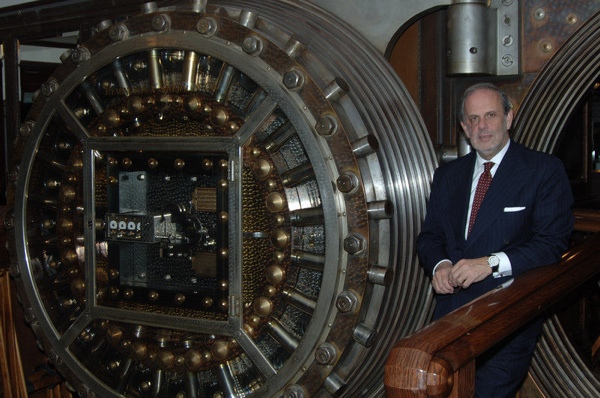
JP Morgan and Chase has a couple of notable, highly-secure repositories. One of them is found five stories below street level in Manhattan, New York and, at over a football field in length, is regarded as the largest gold vault in the world. While the sheer size is impressive, some people are more interested in its proximity to the United States’ Federal Reserve Vault, as the two stockpiles are positioned right across the street from each other. Some conspiracists believe the two super-bunkers are connected by an underground tunnel and somehow JP Morgan and the government are in cahoots to manipulate the US economy.
The location of the bank’s other vault was a mystery until in March 2013 when Zerohedge discovered it was located in London below the firm’s office complex. It just so happens this subsurface bank is also next to a governmental reserve, the Bank of England, and the subway tunnel connecting the two coincidentally (or not if you’re a skeptic) shuts down every weekend.
As with any proper safe, both the JP Morgan vaults are capable of surviving a direct nuclear blast.
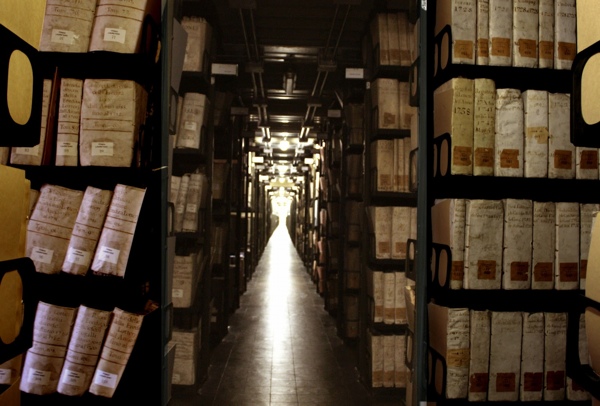
There are no shortages of conspiracy theories surrounding the Catholic Church (after all, Dan Brown made a career writing about the stuff), and a reoccurring theme is if the public could only gain entry to the Vatican Secret Archives then all the Church’s mysteries would be exposed.
Of course, Catholic officials say there is nothing clandestine going on in the centuries old, labyrinthine vault, and the things inside it aren’t so much “secret” as they are “private.” The archive is defended 24-hours a day by the Pontifical Swiss Guard, and is said to have vast storerooms and over 50 miles of shelves lined with documents dating back to the 8th Century.
To honor the archive’s 400th anniversary, and undoubtedly to quell suspicions, in 2012 the church put hundreds of Vatican artifacts on display at the Capitoline Museums. Some of the most notable pieces in the collection were court documents from the trial of the Knights Templar, papers from Galileo’s heresy trial, and a request for an annulment for Henry VIII.
Despite the church’s attempt at openness, critics say the contents aren’t accessible enough since only qualified clergy and academics are allowed inside the facility, and even those granted entry cannot view items without advanced approval.
Thus, the skeptics remain, with theories ranging from the cavern hiding gospels that contradict the Bible, to it housing the earliest known collection of pornography, and holding plans to control the world. Oddly enough, there’s even an urban legend floating around in some Mormon circles that the Vatican vaults have some missing books of the Bible which verify the Mormon religion is true.
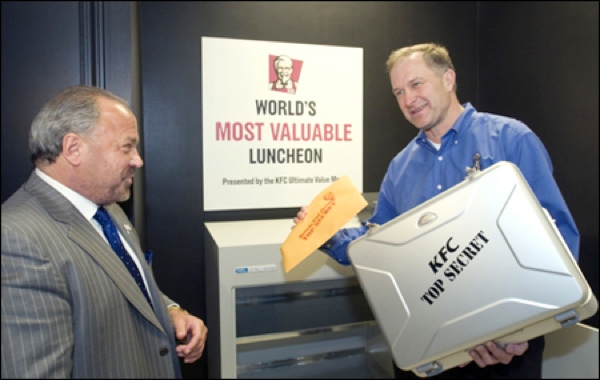
While bankers protect their gold and religions guard their relics, to a fast food empire, nothing is more valuable than a secret recipe. For KFC, that precious recipe consists of the 11 undisclosed herbs and spices in Colonel Sander’s original fried chicken recipe.
In 2009, the recipe was given an upgraded safe in KFC’s headquarters in Kentucky. During the five months when the vault was being constructed, the recipe was kept in an undisclosed location and was transported in true secret agent style—via a lockbox handcuffed to the wrist of a security consultant.
Now the recipe is kept behind an assortment of state-of-the-art security technology, including motion detectors, cameras, and 24-hour guards. Thick concrete slabs surround the safe and the entire security system is connected to a backup generator.
And don’t try to convince the drive thru guy into revealing the restaurant’s chicken formula, since not even the president of KFC can get his hands on the recipe. Apparently only two company executives have permission to use the safe at any one time, and no one knows who they are. Also, they keep suppliers from getting wise by ordering the ingredients from multiple companies.
Naturally, some of the hype surrounding the recipe is just for publicity, but KFC is definitely serious about keeping it hush-hush. In 2001, they initiated a lawsuit against a couple who claimed they found the Colonel’s original recipe in one of his old homes.
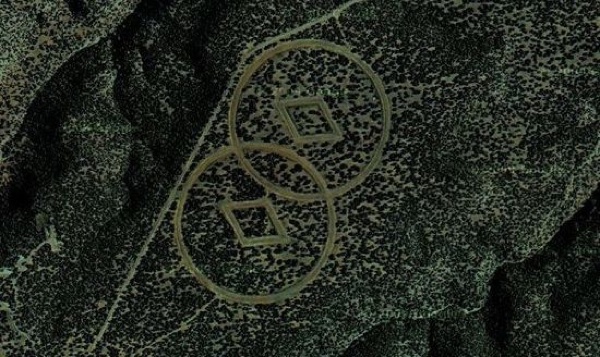
The Scientologists are yet another religion with an impenetrable bunker shrouded in mystery (apparently God like secrets). Their vault is in an underground complex in a New Mexican desert, only a few hours drive from the alien hotspot Roswell, New Mexico.
Inside the cave, which is built to withstand a hydrogen bomb, are titanium caskets containing steel plates and gold discs inscribed with fundamental scientology teachings. All is shielded by three, 5,000 lb stainless steel doors. On the ground above the vault are crop circle-esque markings that are only distinguishable from the sky.
Naturally, most people assume the symbols are meant to communicate with extra-terrestrials, and former scientology members have confirmed the speculations by explaining the markings are meant to act as a landmark for future scientologists who visit Earth from different planets.
Still, others have said the symbols aren’t necessarily meant to signal aliens but represent a “return point” for church founder L. Ron Hubbard, who Scientologists believe will need to find his way back to the religious base after he is reincarnated.
Unless you’re in the upper echelons of Scientology, you’ll probably never catch a glimpse of this bizarre vault, as it’s defended with gates, armed guards, and security cameras.

Although Norway technically owns the Doomsday Seed Vault, funding is granted by the Global Crop Diversity Trust, the Bill & Melinda Gates Foundation, and other organizations and governments. Furthermore, the Norwegians give absolute ownership and right of entry to anyone using one of their safety deposit boxes.
As its name suggests, the vault, officially known as the Svalbard International Seed Vault, is designed to store a wide assortment of seeds in an effort to preserve crop diversity and assure humans will have a source of food no matter what earthly disasters occur.
The storage compound is located in Svalbard—one of the remotest places on the planet that’s still fairly accessible. Svalbard is a large, barren rock island in the Arctic Circle, and the vault is situated inside an old copper mine. As if the isolated landscape weren’t enough, the seed safe is defended with blast-proof doors, motion sensors, airlocks, and one meter thick steel reinforced concrete. Its unique climate and position should keep the seeds safe from any disaster, man-made or otherwise, for centuries.
Alas, even a seemingly straightforward seed cache hasn’t escaped the cynic’s watchful eye, as some find it curious that big names like Rockefeller and Bill Gates are interested in seed preservation. In one headline, investigative journalist William Engdahl wrote, “Doomsday Seed Vault in the Arctic—Bill Gates, Rockefellers and the GMO giants know something we don’t.”
There is suspicion that well-known philanthropists like Gates are giving sterilization vaccinations under the guise of humanitarian aid, while they really have plans to create some kind of master race. Apparently, the seeds tie in with their plot of global control and depopulation.
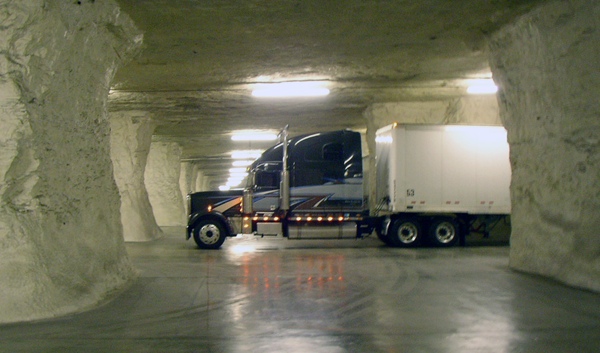 Iron Mountain Vault in Germantown, New York is a for-profit underground records storage facility that serves customers across the globe. It is found in an abandoned mine formerly used as a mushroom farm before being transformed into the largest subterranean records vault on the globe. Taking advantage of Cold War paranoia, the security company first opened in the 1950s and offered a way to shelter corporate documents amid nuclear attacks.
Iron Mountain Vault in Germantown, New York is a for-profit underground records storage facility that serves customers across the globe. It is found in an abandoned mine formerly used as a mushroom farm before being transformed into the largest subterranean records vault on the globe. Taking advantage of Cold War paranoia, the security company first opened in the 1950s and offered a way to shelter corporate documents amid nuclear attacks.
Today, ‘no trespassing signs’ surround the perimeter of the complex, and no one is allowed past the guard gate without two forms of I.D. and special clearance. A 28-ton, triple time-locked door blocks the 95-acre bunker, which is seven layers deep and buried a quarter mile into the mountain. Despite its extraordinary size and purpose, most Germantown residents don’t even know the facility exists.
On a side note, Bill Gates is storing items in this vault too, so maybe he does know something we don’t.

Switzerland is practically synonymous with secret vaults, as banks throughout the country provide their customers complete anonymity and a no-questions-asked attitude. While the deposit boxes are highly guarded, the real protection comes from the doctor-patient type of confidentiality the bankers take with their clients. A great many of their customers aren’t even Swiss citizens but tax evaders, corrupt officials, mobsters, dictators, and general cheats from America and beyond. The banks deny helping anyone to engage in criminal activity, yet one former mid-level Swiss banker divulged that he personally helped his clients defraud the US Treasury out of billions of dollars in taxes.
However, his breach of privacy is rare considering Swiss law is especially strict on any violation of confidentiality in banking or commerce, and committing such an offense can result in jail time or a substantial fine.
In many cases, banking customers are so desperate to remain unidentified they specifically ask their Swiss bankers to never contact them. Interestingly, this has resulted in billions of unclaimed money that’s left dormant once the owner dies. Recently, many banks in Switzerland are working to unite some of the forgotten funds with relatives of the original bank clients, but it’s proving a difficult task that requires a private detective like approach, and even when inheritors are found some assume they’re being scammed and refuse to talk to the bank.
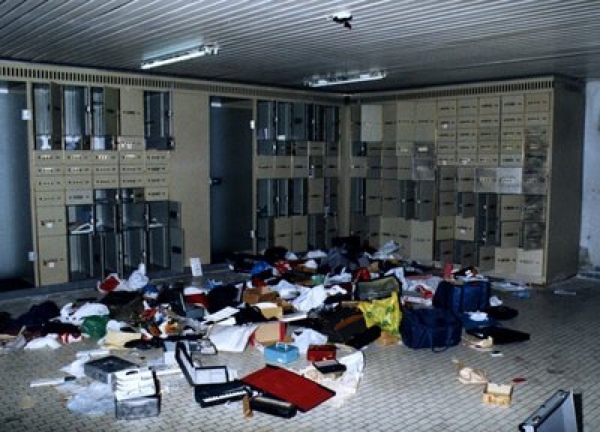
The Antwerp Diamond Vault in Belgium is best known for two reasons: for being the world’s most impenetrable diamond safe and, contrarily, being the victim of a baffling diamond heist in 2003.
The vault was originally built by a collection of 1500 diamond merchants and houses around 70% of the world’s diamonds. Obviously, the founders took great efforts to secure their valuables and outfitted it with un-matched security equipment, including heat detectors, Doppler radar, seismic sensors, magnetic fields, and a lock with over 100 million possible combinations that was designed to shut down for hours if the wrong code was entered in twice. Furthermore, the door itself was three tons, constructed of solid steel, and would’ve required 12-hours of non-stop drilling to penetrate.
Regardless of the multi-tiered security system, a ring of Italian thieves known as “The School of Turin” broke in and stole $100 million worth of diamonds and other treasures. In true “Oceans 11” style, they set off no alarms and Antwerp officials weren’t aware of the breach until the next morning when they arrived at the Diamond Center and discovered their safe gaping open and ransacked.
The booty was never found, but police did arrest one man, Leonardo Notarbartolo, based on DNA evidence found at the scene. He claims a diamond merchant hired his team for the heist and it was all part of an elaborate plan to fraud the insurance company.
The Antwerp Diamond Center has since upped its security even more, yet it seems the 2003 incident has shown that even the most sophisticated vault is no match for a truly determined criminal mastermind.
